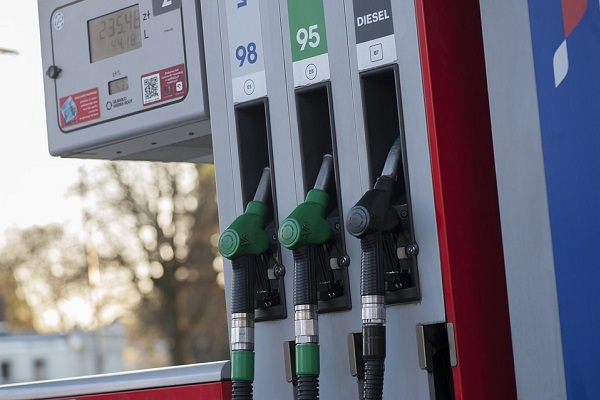
–>
July 9, 2022
“[When] it comes to the gas prices, we’re going through an incredible transition that is taking place that, God willing, when it’s over, we’ll be stronger and the world will be stronger and less reliant on fossil fuels when this is over.” So said President Biden on May 23.
‘); googletag.cmd.push(function () { googletag.display(‘div-gpt-ad-1609268089992-0’); }); }
We are left to assume that today’s astronomical prices at the pump ($6.78 for hi-test in California town yesterday) are only temporary and that prices will return to lower levels after the transition to wind and solar is completed. But this is pure fantasy. Wind and solar power are far more expensive sources of energy than fossil fuels. That’s why coal, oil, and gas became our predominant sources of energy in the first place. The only reason there are wind and solar to speak of is that the government has subsidized their development with taxpayer dollars.
But why would environmentalists want Americans to spend more on energy? Because they believe that wealth is the great enemy of the environment. People in poor countries don’t mar the natural landscape with superhighways and factories and shopping malls and skyscrapers. “In fact, giving society cheap, abundant energy would be the equivalent of giving an idiot child a machine gun,” wrote Stanford professor Paul Ehrlich in 1975.1
Environmentalists’ desire to halt development of the natural landscape is plainly visible in their restricting of the water supply in California. Since 1970, the population of California has increased 100 percent, but the volume of water in her reservoirs has increased only 26 percent.2 The last major dam in California was built 42 years ago. Environmentalists fight the construction of every new water project, including even desalination plants, which could be a source of virtually unlimited water for Californians. But more water would mean more people, more wealth, and more transformation of the landscape. (It would be a mistake to attribute California’s water shortage to radical environmentalists; in California, garden-variety environmentalists have simply enjoyed more power to enact the standard green agenda than their comrades elsewhere.)
‘); googletag.cmd.push(function () { googletag.display(‘div-gpt-ad-1609270365559-0’); }); }
Climate change doomsayers never specify what would be an ideal temperature level for human purposes. Yet this is an interesting question, considering that average temperatures have varied dramatically on Earth, even during man’s short time here. But the premise behind the effort to eliminate fossil fuels — and economic growth in general — is that nature knows best. Whatever nature serves up, whether it be warmer or cooler temperatures, would be better for man and other life forms than any change in temperatures that might result from human activities (not that such activities are in fact causing climate change to any significant extent).
The premise that nature knows best entails profound implications for any country that adopts it as a guide to policy, as the United States is doing. It implies, for one thing, that government should restrict individuals’ freedom to alter the land, the waters, and the atmosphere. Indeed, the need to restrict that freedom is a defining premise of environmentalism.
Consider that in California, in order to build anything on private land, an owner must comply with pages and pages of detailed environmental restrictions before he’ll be permitted to move a shovelful of dirt. In El Dorado County, where I live, a landowner must obtain permission from the county to remove any native oak tree of six inches’ diameter or more. For any project on over an acre that has 80 percent canopy coverage by “woodlands habitat,” a landowner must retain 60 percent of the tree canopy. A builder of a large, residential planned development must leave 30% of the site in its natural state. Any landowner who must ask government permission — or surrender a chunk of his rights — in order to make changes to his property is an owner in name only.
Would we still consider America a free country if writers had to seek government approval of their manuscripts before they could be published? Land use censorship is every bit as pernicious as any other form of censorship. Indeed, in the absence of private ownership of land, no other rights are possible. Try to imagine freedom of religion if the government controls all the land; have you tried to erect a Christmas creche on a public square lately?
The first plank in Marx’s Communist Manifesto called for the abolition of private land ownership. The complete absence of individual rights in Marxist countries like the Soviet Union, Mao’s China, and Castro’s Cuba was not an idiosyncrasy of those regimes, but a logical concomitant of state ownership of land and capital.
Under the Biden administration, we are getting a foretaste of a green future. The high costs of gasoline, heating oil, and electricity; the consequent high prices of everything else; the food shortages; and economic recessions will all be permanent features of a green America. Tried flying lately? Consider the phase-out of air travel to be already underway. Supply chain problems causing empty shelves at the store? Not to worry; when “buy local” is your only choice, you won’t have to worry about supply chains.
‘); googletag.cmd.push(function () { googletag.display(‘div-gpt-ad-1609268078422-0’); }); } if (publir_show_ads) { document.write(“
Don’t like arbitrary government mandates? Don’t like what the COVID lockdowns did to your constitutional rights? Don’t like seeing the rule of law abandoned before your eyes — from our open southern border to the homes of our Supreme Court justices? Consider all this your introduction to socialist governance.
Beyond all this, an America without fossil fuels will be able to support far fewer people than are able to live and thrive in today’s economy. The alarmists claim that the continued use of fossil fuels will cost countless human lives. But what of all those who will perish as food, shelter, and clothing become increasingly scarce under green socialism? What about all the lives that will be lost as modern health care, distinctly a product of capitalist industrialism, begins to contract toward its ultimate extinction? And what about security against foreign attack? The world is a dangerous place, and wealth is the foundation on which our national defense rests.
Yet science says we have no choice but to prohibit the use of fossil fuels — according to the environmentalists. Science says that we have no choice but to surrender our freedom and our prosperity. But the choice whether to extinguish the use of fossil fuels is not a scientific one, any more than the choice to consider all men equal was a scientific one. It is a moral choice.
It is a choice whether to continue actively living in a world that is and always has been fraught with risk, or to hunker down, wall ourselves off from the world’s risks (real or imagined), and slowly die. This is a moral matter, not a scientific one. (The recent COVID lockdowns illustrate the alternatives perfectly.) Environmentalists say fossil fuels vs. renewables is a life-and-death choice. They are absolutely right.
1. Paul Ehrlich, “An Ecologist’s Perspective on Nuclear Power” in the Federation of American Scientists Public Interest Report 28, 5-6 (1975): 5.
2. Calculated using numerous sources, including Interactive California Reservoir Levels Dashboard – Engaging Data (engaging-data.com).
Tom McCaffrey is the author of Radical by Nature: The Green Assault on Liberty, Property, and Prosperity.

Image: AndrzejRembowski via Pixabay, Pixabay License.
<!– if(page_width_onload <= 479) { document.write("
“); googletag.cmd.push(function() { googletag.display(‘div-gpt-ad-1345489840937-4’); }); } –> If you experience technical problems, please write to [email protected]
FOLLOW US ON
<!–
–>
<!– _qoptions={ qacct:”p-9bKF-NgTuSFM6″ }; ![]() –> <!—-> <!– var addthis_share = { email_template: “new_template” } –>
–> <!—-> <!– var addthis_share = { email_template: “new_template” } –>






